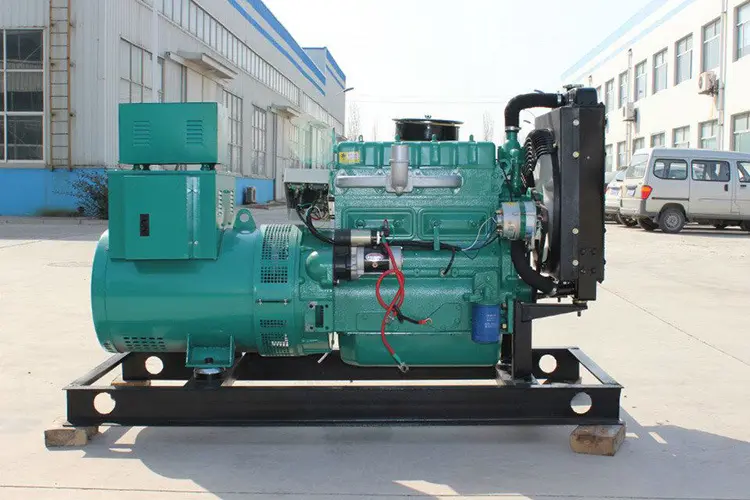Powering Construction Sites The Indispensable Role of Diesel Generators

Introduction:
Construction sites are bustling hubs of activity, where heavy machinery, tools, and equipment come together to shape the built environment. However, these sites often lack a reliable source of electricity, making it essential to have a backup power solution in place. In this article, we will delve into the world of diesel generators and explore their crucial role in powering construction sites. From their working principles and benefits to their selection and maintenance, we will cover all aspects to help construction professionals make informed decisions.

1. Understanding Diesel Generators:
1.1 How do Diesel Generators Work?
Diesel generators are robust machines that convert diesel fuel into electrical energy through the combustion process. These generators consist of an engine that drives an alternator, converting mechanical energy into electrical energy. The engine is powered by diesel fuel, which is ignited, creating the necessary combustion to drive the generator. Real-world reviews of popular 400kW generators can be used to power construction tools, machinery, lighting, and other essential equipment.
1.2 Types of Diesel Generators:
There are various types of diesel generators available for construction sites, ranging from small portable units to large, stationary generators. Portable diesel generators are suitable for smaller construction projects or as backup power sources, while stationary diesel generators are more appropriate for larger construction sites requiring a continuous and substantial power supply.
2. Benefits of Diesel Generators on Construction Sites:
2.1 Reliability and Durability:
Diesel generators are renowned for their reliability and durability, making them ideal for construction sites. They are designed to withstand the rugged conditions of construction environments, ensuring uninterrupted power supply even in the harshest conditions. Their sturdy construction and robust engines make them less susceptible to damage from vibrations and impacts, ensuring long-lasting performance.
2.2 Cost-effectiveness:
Diesel fuel is generally less expensive than other fuel options, making diesel generators a cost-effective choice for construction sites. Additionally, diesel engines have a higher fuel efficiency compared to gasoline engines, resulting in lower fuel consumption and reduced operating costs. Moreover, diesel generators require less maintenance and have longer lifespans, further contributing to their cost-effectiveness.
2.3 High Power Output:
Construction sites often require a substantial amount of power to operate heavy machinery, tools, and equipment. Diesel generators can deliver high power output, making them well-suited to meet the energy demands of construction sites. They can provide consistent and reliable power for extended periods, ensuring the smooth operation of construction activities.
2.4 Portability and Versatility:
Portable diesel generators offer the advantage of mobility, allowing construction professionals to easily move them to different areas of the site as needed. This flexibility is invaluable on construction projects with changing power requirements. Furthermore, diesel generators can power a wide range of equipment, including lighting systems, compressors, welding machines, and more, making them highly versatile.
2.5 Safety Features:
Diesel generators are equipped with various safety features to ensure the well-being of construction personnel. These features may include automatic shutdown systems, low oil pressure alarms, and overload protection mechanisms. Such safety measures minimize the risk of accidents and equipment damage, thereby enhancing workplace safety.
3. Selecting the Right Diesel Generator for Construction Sites:
3.1 Assessing Power Requirements:
Before selecting a diesel generator, it is crucial to evaluate the power requirements of the construction site. Consider the total power demand, including both the continuous power needs and any peak loads. This assessment will help determine the generator's capacity, ensuring it can handle the site's electrical demands without overloading or underperforming.
3.2 Determining Mobility Needs:
Consider the mobility requirements of the construction site to determine whether a portable or stationary diesel generator is the appropriate choice. Portable generators are suitable for sites with changing power needs or where mobility is essential, while stationary generators are better for long-term installations and sites with consistent power demands.
3.3 Noise Considerations:
Construction sites are often subject to noise regulations, making it important to select a diesel generator that operates within acceptable noise levels. Look for generators with noise reduction features, such as soundproof enclosures or mufflers, to minimize noise disturbances and ensure compliance with local regulations.
3.4 Fuel Storage and Consumption:
Consider the availability and storage capacity for diesel fuel on the construction site. Calculate the estimated fuel consumption of the generator to ensure sufficient fuel reserves are maintained. Additionally, assess the fuel efficiency of potential diesel generator options to minimize fuel costs and maximize productivity.
4. Maintenance and Safety:
4.1 Regular Maintenance:
To ensure the longevity and optimal performance of diesel generators on construction sites, regular maintenance is essential. Implement a maintenance schedule that includes periodic inspections, oil and filter changes, fuel system checks, and overall performance evaluations. Adhering to the manufacturer's guidelines and conducting maintenance tasks promptly will minimize the risk of breakdowns and extend the generator's lifespan.
4.2 Safety Protocol:
Construction sites carry inherent risks, and it is vital to prioritize safety when operating diesel generators. Train personnel on the safe operation and handling of generators, emphasizing proper fuel storage, fire prevention measures, and the use of personal protective equipment. Regularly inspect the generator and associated components for any signs of wear, damage, or potential hazards.
Conclusion:
Diesel generators play an indispensable role in powering construction sites, providing a reliable and cost-effective source of electricity. Their durability, high power output, and versatility make them well-suited to meet the energy demands of construction projects. By carefully selecting the appropriate generator, ensuring regular maintenance, and implementing safety protocols, construction professionals can enhance productivity, minimize downtime, and create a safer work environment. With diesel generators as a reliable power solution, construction sites can operate smoothly, efficiently, and with confidence.
Word Count: 1,022 words
